|
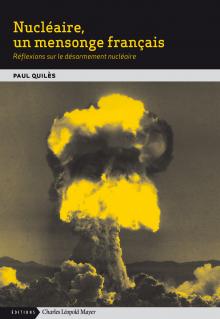 |
|
|
|
He once swam in the waters of Moruroa atoll to ‘prove’ how safe the French nuclear tests were. Now, former Defense Minister Paul Quilès has published a book entitled “Nucléaire, un mensonge français: Réflexions sur le désarmement nucléaire” (Nuclear, a French lie: Reflections on nuclear disarmament) in which he re-examines the assumptions made in France about nuclear deterrence. In doing so, Quilès concludes that the cloak of nuclear deterrence no longer has any validity, and that repeated adherence to nuclear doctrine as a form of security is a lie of monstrous proportions.
Quilès was assisted in his analysis and in writing the book by representatives of Global Zero, Mayors for Peace and PNND France. In addition to providing analysis debunking nuclear deterrence, PNND France Coordinator Jean-Marie Collin contributed a chapter on the vital role French parliamentarians must take to challenge the status quo and to advance collaborative nuclear disarmament initiatives in bilateral, regional and multilateral forums.
For further information, contact collinjeanmarie@yahoo.fr
2. Parliamentarians and the NPT: Vienna, April 30-May 11
| |
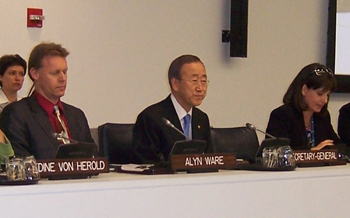 |
| |
PNND Coordinator Alyn Ware chairs the session with Secretary-General Ban Ki-moon and PNND members at the 2010 NPT Review Conference |
In 2010, at the five-yearly review conference of the nuclear Non-Proliferation Treaty, parliamentarians and parliaments played a key role in moving governments to agree to a range of nuclear disarmament measures in order to start building the framework for a nuclear weapons free world. These included specific actions by nuclear-weapon-States, regional actions such as establishing nuclear-weapon-free zones (particularly in the Middle East), and other actions which could be taken by any or all States.
From April 30-May 11 the States Parties to the NPT will be meeting for the first time since 2010 to report on progress implementing the 2010 agreement and prepare for the next full review in 2015. PNND will be presenting the Joint Parliamentary Statement for a Middle East Zone Free from Nuclear Weapons and all other Weapons of Mass Destruction to the Plenary of the NPT on May 2, organising a side event on May 10 on Parliamentary Measures to Support Nuclear Non-proliferation and Disarmament, and participating in other events. See NPT Calendar of Events.
Take action to support the NPT: See Take Action! Parliamentarian support for the NPT
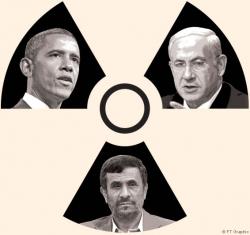 |
|
|
|
What approach should parliaments and parliamentarians be taking towards the looming nuclear crisis in the Middle East? Should they support the use of force against actual or potential nuclear weapons programs in the region? Should they accept that States have a right to develop nuclear weapons for nuclear deterrence, similar to the security frameworks of the Nuclear Weapon States or their allies under extended nuclear deterrence? Or should they actively support diplomatic approaches to preventing nuclear proliferation and achieving nuclear disarmament in the region through initiatives such as the 2012 Conference on Establishing a Middle East Zone Free from Nuclear Weapons and Other Weapons of Mass Destruction? Those favouring the latter approach are building support through parliamentary endorsements of the Joint Parliamentary Statement for a Middle East Zone Free from Nuclear Weapons and all other Weapons of Mass Destruction, motions in parliaments and questions to their foreign ministers.
To add your voice to a diplomatic approach, send your endorsement of the Joint Parliamentary Statement to alyn@pnnd.org
For further information see: Parliamentary call to action: Support diplomacy, not force, to prevent nuclear proliferation in the Middle East!
| |
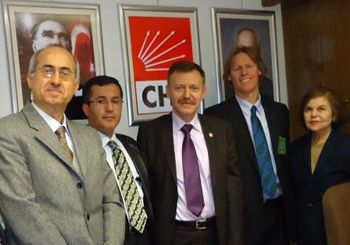 |
| |
Aytug Atici MP with PNND Coordinator Alyn Ware and
IPPNW Turkey members |
Turkey is becoming an increasingly important country in advancing nuclear non-proliferation in the Middle East. Its positive relations with Israel, Iran and most of the Arab nations give Turkey an opportunity to play a mediating role. In addition, Turkey is both Muslim and Western – being a member of NATO, OSCE, Organisation of Islamic Cooperation and the Union for the Mediterranean. As such, PNND Global Coordinator Alyn Ware visited the Turkish parliament in March to discuss parliamentary action to support the 2012 Conference on Establishing a Middle East Zone Free from Nuclear Weapons and Other Weapons of Mass Destruction. PNND member Professor Aytug Atici MP followed up by securing endorsements from over 40 Turkish parliamentarians for the Joint Parliamentary Statement for a Middle East Zone Free from Nuclear Weapons and all other Weapons of Mass Destruction.
PNND also participated in a Peace Boat Horizon 2012 conference, strategy workshop and public events supporting a Middle East Zone in March, which included participants from Israel, Iran and Arab countries. The events took place on the Peace Boat as it sailed the Mediterranean, and in the ports of Civitavecchia (Italy), Piraeus (Greece) and Istanbul (Turkey). See Peace Boat Press Statement - Horizon 2012: Sailing in the Same Boat Toward a Nuclear Weapons-Free Zone in the Middle East, Mar 27, 2012.
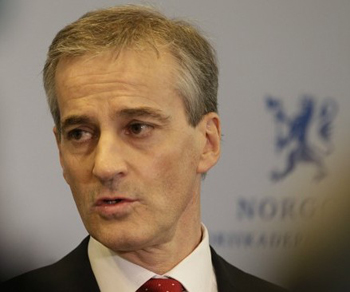 |
|
Jonas Gahr Støre, Norwegian Foreign Minister |
|
On Tuesday, 17 April, Foreign Minister Jonas Gahr Støre, announced in the Norwegian parliament that Norway would host a conference in the Northern Hemisphere spring 2013 to highlight the humanitarian consequences of nuclear weapons. This follows the concern expressed by States Parties to the nuclear Non-Proliferation Treaty in 2010 in the final agreed document about “the catastrophic humanitarian consequences of any use of nuclear weapons,” and their agreement of “the need for all States at all times to comply with applicable international law, including international humanitarian law.”
Mr Store noted the importance of humanitarian law in achieving treaties banning landmines and cluster munitions, and added “To achieve a binding ban on nuclear weapons, the most important thing we can do is to strengthen the political support for such a ban and to develop practical conditions for the achievement of this goal." (Click here for the full speech in Norwegian – scroll down to Utenriksminister Jonas Gahr Støre [13:08:15])
Marit Nybakk, Vice-President of the Norwegian Parliament and PNND Co-President welcomed the announcement and indicated that “Norway will invite states, UN agencies, the International Red Cross and other NGOs to the conference. To see disarmament and abolition of nuclear weapons from a humanitarian perspective may further underline the necessity of a convention against nuclear weapons.”
The Norwegian initiative reflects a growing momentum to use IHL in order to build political momentum for the abolition of nuclear weapons, similarly to the way the IHL was used to help ban landmines and cluster munitions (see An Ottawa Process for Nukes? Op/ed, The Embassy, Canada’s Foreign Policy Weekly). On November 26, 2011, the International Red Cross and Red Crescent Movements adopted a resolution on the irreconcilability of nuclear weapons with IHL, calling for States to undertake in good faith, and conclude, negotiations to prohibit the use of and completely eliminate nuclear weapons through a legally binding international agreement.
Parliamentarians have a unique opportunity to seize these developments and strengthen the growing norm against nuclear weapons through your respective legislatures. See International Humanitarian Law, Nuclear Weapons and Parliamentarians).
| |
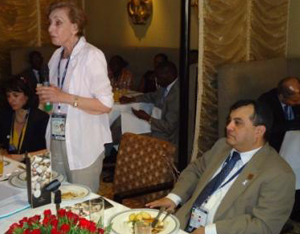 |
| |
Senator Green and Saber Chowdhury chair PNND lunch at IPU Assembly |
| |
|
In April 2009, the Inter-Parliamentary Union (IPU), comprising over 150 parliaments including most of the States possessing nuclear weapons and their allies, adopted a groundbreaking resolution on nuclear non-proliferation and disarmament. The resolution promotes a range of non-proliferation and disarmament measures, and calls on parliaments to encourage their governments to support the UN Secretary-General’s Five-Point Nuclear Disarmament Plan (which includes the proposal for a global treaty or package of agreements to abolish nuclear weapons). PNND members were instrumental in building consensus from all member parliaments for the resolution.
In follow-up to the resolution, IPU has commissioned PNND to produce a Handbook on Parliamentary Measures to Support Nuclear Non-proliferation and Disarmament. The handbook will contain background on the range of non-proliferation and disarmament issues; examples of parliamentary practice in nuclear-weapon-possessing States, allies of nuclear-weapon-states and non-nuclear States; and recommendations for further action by parliaments and parliamentarians. A draft of the handbook was circulated at the IPU Assembly in Kampala at a PNND lunch on April 4, co-chaired by Saber Chowdhury (President of the IPU Standing Commission on International Peace and Security) and Senator Rosario Green (President of the IPU Committee on United Nations Affairs). Over 70 parliamentarians from 35 countries attended the PNND lunch.
A global advisory board of key parliamentarians and disarmament experts will review and edit the draft in preparation for the release of the handbook at the 127th IPU Assembly in Quebec, Canada, October 25-28, 2012, after which it will be sent to every parliament in the world to encourage, support and guide parliamentary action.
Since 2008, PNND, Pugwash Canada and Pugwash Denmark have been collaborating to advance proposals for cooperative security in the Arctic Circle including a proposal for an Arctic Nuclear Weapon Free Zone. (See Nukes, climate change and the Arctic – new Cold War or a NWFZ? and Denmark, the NPT and an Arctic Nuclear Weapon-Free Zone). Prior to the September 2011 elections, the Danish Social Democratic Party adopted policy supporting an Arctic NWFZ. Upon assuming office, the coalition government, headed by the Social Democrats, began a series of consultations with other non-nuclear circumpolar nations on the proposal.
On March 28, 2012, PNND member Holger Nielsen chaired a meeting between Danish parliamentarians and representatives from the embassies of the non-nuclear circumpolar countries at Christiansborg Palace, Copenhagen in order to discuss next steps in advancing the proposal. The meeting, organised by Pugwash Denmark, also included input from NWFZ experts Adele Buckley (Canada) and Jan Prawitz (Sweden). One of the proposals discussed was for the establishment of a UN study group in order to examine the issues, explore the political processes and engage the varying constituencies involved in establishing an Arctic zone based on the UN experience in the establishment of other NWFZs.
PNND, Pugwash Denmark and Pugwash Canada will plan additional events in order to enhance the cross-party dialogue and build political momentum on this initiative.
The maintenance of nuclear deterrence doctrines remains one of the biggest barriers to preventing nuclear proliferation and achieving nuclear disarmament.
The Nuclear Abolition Forum, an initiative launched in 2011 to facilitate dialogue on the process to achieve and maintain a nuclear-weapon-free world, is preparing the next issue of its magazine which will focus on nuclear deterrence. The Forum will hold a roundtable discussion in Vienna on May 9 entitled Moving Beyond Nuclear Deterrence to a Nuclear-Weapons-Free World. The roundtable will include both advocates and critics of nuclear deterrence in order to examine the utility and validity of the doctrine and to explore the political conditions and security mechanisms that might be required to phase out nuclear deterrence in order to achieve a nuclear-weapons-free world.
For more information contact Rob van Riet, Director of the Nuclear Abolition Forum. rob.vanriet@worldfuturecouncil.org
| |
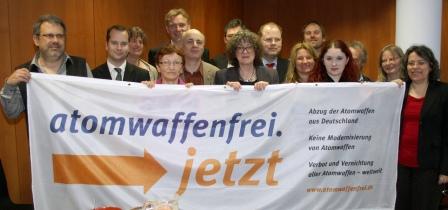 |
| |
German parliamentarians and civil society experts at nuclear disarmament breakfast |
On March 29, parliamentary members of the German Bundestag Sub-commission on Disarmament and Arms Control from different political parties joined civil society campaigners at a breakfast meeting in the Bundestag to discuss a new campaign, Atomwaffenfrei Jetzt (Nuclear Weapons Free Now!). The meeting included an experts’ report on the US modernization plans for nuclear weapons including those publicly known to be located in Germany, despite the fact that neither the US nor the German governments admit this. Such secrecy appears to run counter to the agreement by States parties to the NPT on the importance of transparency in nuclear weapons numbers and deployments.
Flashback: On 28 of September, 2011, the German Foreign Minister replied in parliament to questions posed by PNND members on the German policy toward a Nuclear Weapons Convention. Here are some excerpts:
The Federal Government regards disarmament, arms control and non-proliferation as central planks of a global security architecture. It is proactive in pursuing substantive progress in these areas and supports the goal of a nuclear-weapons-free world. The Federal Government has worked with determination on this basis and in response to the calls for concrete progress in the area of nuclear disarmament and non-proliferation made in the cross-party motion for a resolution of the German Bundestag of 26 March 2010. It has taken concrete steps to deliver results, including in particular:
- The incorporation of disarmament and arms control and the goal of a nuclear-weapons-free world in NATO’s new Strategic Concept adopted in 2010, in which the Federal Government was one of the main drivers;
- The efforts of the Federal Government to ensure inclusion of substrategic nuclear weapons, not hitherto subject to arms control regulations, on the international agenda for the further disarmament process, thereby creating the conditions to fulfil the Federal Government’s aim to ensure the removal of nuclear weapons still remaining in Germany;
- The agreement reached at the NPT Review Conference in May 2010 with the active involvement of the Federal Government on a forward-looking Action Plan and practical proposals for implementing the Plan submitted subsequently by the Federal Government together with its partners in the Non-Proliferation and Disarmament Initiative;
The Federal Government is in complete agreement with the advocates of a Nuclear Weapons Convention with respect to this goal but regards the demand for an immediate beginning of negotiations for a Nuclear Weapons Convention to be unrealistic at the present time. In the view of the Federal Government, the conditions for beginning such negotiations will not be fulfilled in the foreseeable future…
In 2012/2013 the Federal Foreign Office will provide support for a project launched by the Middle Powers Initiative and the PNND (Parliamentarians for Nuclear Non-Proliferation and Disarmament), the purpose of which is to investigate the conditions for creating a nuclear-weapons-free world…
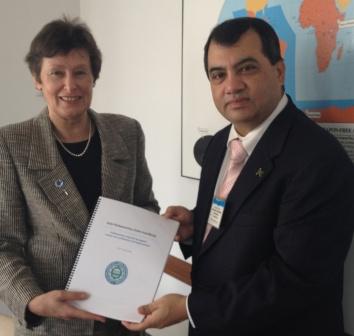 |
|
Saber Chowdhury presents UN High Representative
Angela Kane with the draft IPU handbook |
|
| |
|
| |
|
PNND congratulates Angela Kane on her appointment as the United Nations High Representative for Disarmament, replacing Sergio Duarte who retired on 8 March 2012. Ms Kane, the first woman to hold the position, has previously served as UN Assistant Secretary-General for Political Affairs, focusing on preventing and resolving conflicts. In this capacity, she was in charge of two regional divisions – decolonization and the question of Palestine - and supported several special political missions in Iraq, Nepal and the Middle East.
On April 12, PNND Co-President Saber H Chowdhury, who also serves as the President of the Inter Parliamentary Union Standing Commission on International Peace and Security, met Angela Kane at the UN in New York, congratulated her on behalf of PNND, and presented her with the draft IPU Handbook on Parliamentary Measures to Support Nuclear Non-proliferation and Disarmament. The handbook includes a number of examples (and further recommendations) of parliamentary support for UN nuclear disarmament resolutions, and collaboration with the UN – in particular with the UN Secretary-General and the High Rep for Disarmament.
PNND Council Member Mani Shankar Aiyar, former aide to Rajiv Gandhi, is traveling the globe to promote a number of practical recommendations for nuclear abolition made by an advisory group appointed by Indian Prime Minister Manmohan Singh in 2010 and which Mani Shankar chairs.
The Rajiv Gandhi Action Plan Group, established to breathe new life into Rajiv Gandhi’s 1988 plan for a Non-violent and Nuclear-Weapon-Free World Order, presented its findings to the Prime Minister in August 2011. The 284-page report outlines a seven-point roadmap, including short-term steps to lower the role of nuclear weapons in security doctrines, reduce the operational readiness to use nuclear weapons, and encourage a global agreement on no-first-use; followed by medium and longer-term measures including a global agreement prohibiting the threat or use of nuclear weapons and negotiations for a comprehensive Nuclear Weapons Convention that would provide for the complete elimination of nuclear weapons.
Since presenting the report to the Prime Minister, Mani Shankar Aiyar has been travelling to key international conferences – such as Global Zero – to build traction behind the recommendations, particularly from key players in other ‘nuclear armed nations’.
“The time has come for India to take the lead in opening formal multilateral negotiations on nuclear disarmament,” said Aiyar. “India should leverage its strategic partnerships with leading powers like the US to push the cause. US President Barack Obama's landmark speech in Prague in 2009, advocating a world free of nuclear weapons, indicates a change in the US position which has revived hopes for pursuing disarmament realistically at global fora. Since then, the UN Secretary General has put forward proposals that are largely compatible with the Rajiv Gandhi Action Plan," says Aiyar. "There are also a much larger number of governments, including those under the nuclear umbrella, who have been actively advocating the cause of disarmament."
See: India to continue worldwide Nuke-disarmament campaign, KUNA, 4 April 2012
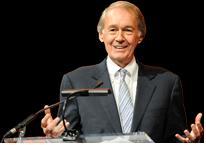 |
|
Congressman Markey introduces the SANE Act |
|
| |
|
On February 8, PNND Co-President Congressman Edward J. Markey took to the US House of Representatives floor to decry the wasteful spending in America’s nuclear weapons programs and to introduce legislation that would cut $100 billion over the next ten years from America’s bloated nuclear weapons budget. The Smarter Approach to Nuclear Expenditures (SANE) Act of 2012 cuts specific nuclear weapons and related programs.
“It is insane that Republicans are proposing to block the automatic defense cuts mandated by the debt deal while America’s nuclear weapons budget teems with billions in wasteful spending,” said Rep. Markey, senior member of the House Energy and Commerce Committee and founder of the Bipartisan Nonproliferation Task Force. “It is insane to spend hundreds of billions on new nuclear bombs and delivery systems to fight a long-past Cold War while ignoring our 21st century security needs and seeking to cut Medicare, Medicaid and social programs that millions of Americans depend on. The SANE Act will cut spending on outdated, wasteful nuclear weapons and related programs over the next ten years and will strengthen our long-term economic and national security.” (see video of Rep. Markey’s floor statement).
Specifically, The Smarter Approach to Nuclear Expenditures (SANE) Act of 2012 will:
- Cut the current fleet of nuclear submarines from 12 operational at sea to eight operational at sea ($3 billion savings)
- Delay the purchase of new nuclear submarines ($17 billion savings)
- Reduce the number of ICBMs ($6 billion savings)
- End the nuclear missions of air bombers (up to $17 billion savings)
- Delay new bomber program ($18 billion savings)
- Cancel new, wasteful nuclear weapons facilities ($15 billion savings)
The SANE Act is co-sponsored by 34 other members of congress and supported by the Congressional Progressive Caucus. It is also being promoted by a coalition of US disarmament organisations as part of the US Campaign for a Nuclear Weapons Free World.
Tensions in NE Asia escalated again recently with widespread opposition to a ballistic missile test by North Korea on 17 April, despite the failure of the test. South Korea, Japan and the United States, in particular, are concerned that the development of such missiles could provide a platform for North Korea to deliver nuclear weapons. These fears were compounded when North Korea withdrew from the nuclear Non-Proliferation Treaty in 2003 and then tested nuclear weapons in 2006 and 2009 demonstrating its nuclear weapons capability. Intelligence sources indicate that North Korea is preparing for another nuclear test in the near future (See Exclusive: North Korea's nuclear test ready "soon", Benjamin Kang Lim, Reuters, 24 April).
Given the failure of sanctions and other diplomatic pressure on North Korea to convince them to give up the nuclear weapons option, a cross-party group of legislators from Japan and South Korea brought together by PNND have been exploring a proposal for a North East Asian Nuclear Weapon Free Zone Treaty. They argue that such treaty would lower the role of nuclear weapons in the region and provide security assurances to all three countries that they would not be attacked by nuclear weapons. As this would address key security concerns of North Korea – (at the same time as enhancing the security of Japan and South Korea) the lawmakers believe that the proposal is the best option for securing North Korea’s agreement to give up the nuclear option and to provide a sustainable denuclearization of the Korean Peninsula.
The legislators have held a number of cross-party forums to advance the proposal, the most recent being a ROK-Japan Parliamentarians' Forum on Denuclearization of Northeast Asia held at the National Parliament Building in Seoul on March 9 and 10, 2012. Five MPs and several MP secretaries from ROK and three MPs and two experts from Japan participated. MPs from both countries agreed to strengthen efforts to expand support among for the Joint Parliamentary Statement for a Northeast Asia NWFZ issued last year, while seeking more understanding on the nuclear fuel cycles of each country.
PNND members are also part of a recently established Asia-Pacific Leadership Group on Nuclear Non-proliferation and Disarmament, which held an East Asia Nuclear Security workshop in conjunction with the Nautilus Institute on November 11, 2011 in Tokyo, Japan to discuss the proposal.
| |
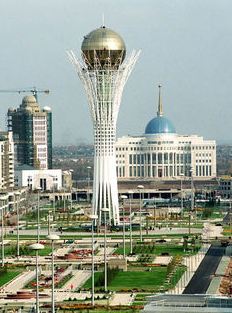 |
| |
Astana, Kazakhstan |
From 27-30 August, parliamentarians from around the world will gather in Astana, Kazakhstan for the 2012 Astana-Semipalatinsk Forum: From a nuclear test ban to a nuclear-weapons-free world. Hosted by the Kazakhstan Parliament and organised by PNND, the forum will build upon the nuclear disarmament experience and inspiration of Kazakhstan in order to shape parliamentary action and build political momentum to achieve the global abolition of nuclear weapons.
Kazakhstan, under the continuing leadership of President Nazarbayev, closed down the Soviet nuclear test-site on their territory in 1991, facilitated the withdrawal of over 1500 nuclear weapons deployed on its territory following the collapse of the USSR, negotiated with its neighbours to establish a Central Asian Nuclear Weapon Free Zone, sponsored the UN resolution which established the International Day to End Nuclear Tests, and in 2011 launched an international effort to achieve a nuclear-weapon-free world (See the Astana Declaration for a Nuclear Weapon-Free World).
The three-day Forum, to be opened by President Nazarbayev, will include a trip to the former nuclear test site in Semipalatinsk and the Kazakhstan Radiation Research Centre, along with discussions on key nuclear disarmament issues followed by the PNND annual assembly. For more information contact alyn@pnnd.org.
|
